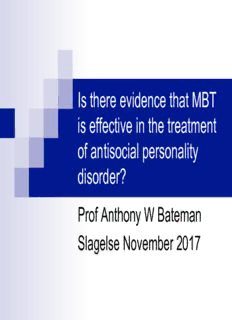
Antisocial Personality Disorder PDF
Preview Antisocial Personality Disorder
Is there evidence that MBT is effective in the treatment of antisocial personality disorder? Prof Anthony W Bateman Slagelse November 2017 168 patients screened for eligibility 34 patients excluded: 10 did not attend interview Consort Diagram – IOP Study: 12 declined participation 5 did not meet inclusion criteria Patient Recruitment Flow-Chart 4 met exclusion criteria 3 were uncontactable 134 randomized 71 patients allocated to MBT-OP 63 patients allocated to SCM-OP 6 attended < 6 months 10 attended < 6 months 13 attended 6-12 months 6 attended 6-12 months 52 completed treatment 47 completed treatment 71 included in analyses 63 included in analyses Moderators of outcome? Bateman, A., & Fonagy, P. (2013). Impact of clinical severity on outcomes of mentalisation-based treatment for borderline personality disorder. British Journal of Psychiatry, 203, 221-227. Predictive Recovery by Axis II Pathology One Axis II Diagnosis Two Axis II Diagnoses 8 . 8 . y y ver6 ver.6 o. o c c e e R R n of .4 n of .4 o o Predicti.2 Predicti.2 Linear 0 Linear 0 2 -. -.2 Baseline 6 months 12 months 18 months Baseline 6 months 12 months 18 months Assessment Periods Assessment Periods Four Axis II Diagnoses Three AxSisC IMI DiagnosesMBT SCM MBT 8 8 . . y very.6 over.6 o c c e e R n of R.4 on of .4 Linear Predictio0.2 Linear Predicti0.2 2 2 -. -. Baseline 6 months 12 months 18 months Baseline 6 months 12 months 18 months Assessment Periods Assessment Periods SCM MBT SCM MBT Predicted Self-Harm By Axis II Diagnoses Two programmes of study : MBT-ASPD – randomised controlled trial (MOAM) SCM – training and implementation Antisocial Personality Disorder Bateman, A., & Fonagy, P. (2011). Antisocial Personality Disorder. In A. Bateman & P. Fonagy (Eds.), Mentalizing in Mental Health Practice (pp. 357-378). Washington: APPI Bateman, A., & Fonagy, P. (2016). Mentalization based treatment for personality disorders: a practical guide. Oxford: Oxford University Press Bateman, A., O'Connell, J., Lorenzini, N., Gardner, T., & Fonagy, P. (2016). A randomised controlled trial of Mentalization-Based Treatment versus Structured Clinical Management for patients with comorbid borderline personality disorder and antisocial personality disorder. BMC Psychiatry, 304, 304-311. ASPD characteristics Failure to conform to social norms with respect to lawful n behaviours Deceitfulness n Impulsivity or failure to plan ahead n Irritability and aggressiveness n Reckless disregard for safety of self or other n Consistent irresponsibility n Lack of remorse n None of these features is endearing to others. The self- serving attitude of people with ASPD and unpredictability makes people wary of them. Why consider ASPD? ASPD Highly prevalent amongst UK offending population and is associated with increase likelihood of committing violent behaviours, future reconvictions and recidivism severity. Societal costs Physical and emotional damage to victims, criminal justice system involvement, increase of health care, lost employment opportunities, relationship breakdown; family disruption and substance misuse. Major public health implications Associations with psychiatric co-morbidity, substance abuse, suicide, family violence and early death. Why Consider ASPD - Recommendations and Implementation of NICE Guidance Crawford et al (2009) Service provision for men with antisocial personality disorder who make contact with mental health services services. Personality and Mental Health 3: 165–171 ASPD who had had contact with mental health n services Ø Nearly all participants met criteria for ‘probable anxiety disorder’ Ø >50% were misusing alcohol and other drugs. 12 months following recruitment n Ø 40% of the sample attended emergency medical services Ø 20% had at least one period of inpatient treatment. Only 21% participants received follow-up care n during the 12 months following recruitment.
Description: